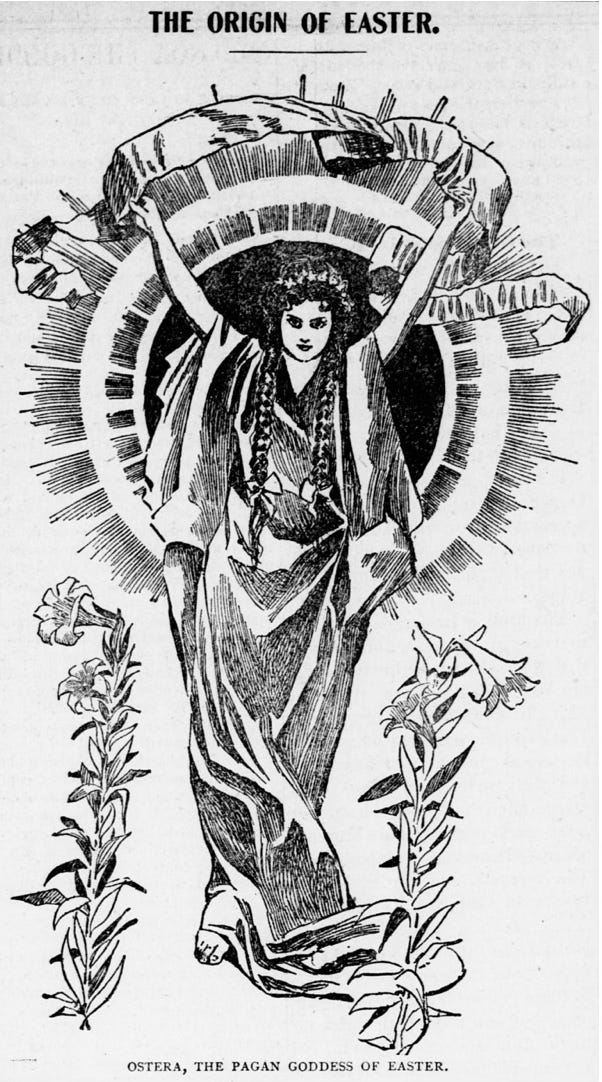Dear Readers,
As Easter approaches, Christians prepare to celebrate the resurrection of Jesus Christ, the pinnacle of importance to our faith. Yet, beneath the pastel eggs, fluffy bunnies (what do these have to do with Jesus?), and sunrise service traditions that predate the empty tomb by centuries lurk shadowy roots that whisper of a stranger, more mysterious past.
I’ve highlighted the occult connections to other holidays like Christmas and the 4th of July, and now it’s Easter’s turn.
For those of us who seek to honor God with purity and truth, it’s worth looking into the layers that make up modern-day Easter to uncover the truth and separate the esoteric and occult origins from the celebration of the resurrection of our Lord and Savior Jesus Christ.
This isn’t about pointing fingers or shaming our brothers and sisters who partake in these customs unaware or due to family obligations. Instead, it’s an invitation to learn, gain resources, and realign our celebrations with the Word of God and with His appointed times, like the true Passover, which often doesn’t even fall at the same time as Easter Sunday.
Where Did Easter Come From?
The very name “Easter” hints at its pre-Christian heritage. Scholars trace it to Eostre (or Ostera/Ostara), an Olde English goddess of spring and fertility celebrated around the vernal equinox. Her festivals, held in what we now call March or April, honored renewal, rebirth, and the awakening of the earth after winter’s slumber.
“Easter” likely derives from the Proto-Germanic austrōn (meaning “dawn” or “east”), related to Eostre.
The timing of Easter isn’t a coincidence, it was deliberately synced with these ancient rites when Catholicism spread across Europe, blending the gospel with local customs to ease conversions.
For more info, check out my documentary An Inconveninet Religion:
Eostre wasn’t alone. In Babylon, the ‘goddess’ Ishtar (pronounced similarly to “Easter”) was celebrated with the same rituals.
She made her way to Rome where she was called Cybele. Across the ancient world, the symbols of colorful eggs, rabbits, and dawn celebrations were the direct result of a myth of the pagan ‘goddess’, trickling down to what we now call Easter.
The tale from 1902 Richmond (Virginia) Times from March 30, 1902 states,
“In England the festival became known as “Easter” from the goddess Eostre, and in the eggs so widely looked upon as typical of Easter is a mark of the old legend of a bird that was changed into a hare in the spring.”
The pagan ‘goddess’ was known to turn a bird into a bunny, and, in addition, the bunny laid colored eggs.
How It Looks Today
The world celebrates with consumerism today.
Eggs have long symbolized fertility and new life in pagan cultures. Ancient Egyptians and Persians dyed eggs to honor the sun’s return at springtime, while Germanic tribes offered them to Eostre. Pagans venerated the sun or moon in hoping to gain favor or power from these ‘gods’.
I love the verse in Revelation 22:5 where, in New Jerusalem, God is our sun and source of light. “They will need no light of lamp or sun, for the Lord God will be their light.”
Even though He created the sun and moon for days and months, warmth and light, He is the only one worthy of worship and praise. He is the Creator, and pagans sadly believe the Luciferian lie of worshipping the creation. (Romans 1:25)
Fast forward to 2025, and Easter is a curious blend of sacred and secular. Families gather for Easter egg hunts, typically unaware that they’re reenacting rites once offered to deities of old. These aren’t symbols of Christ’s sacrifice or victory over death; they’re echoes of rituals meant to appease gods of the harvest and womb.
Churches I drive by have signs that say “He is risen!” Meanwhile storefronts peddle chocolate bunnies and egg-dyeing kits. It all feels like Christmas all over again. Nativities next to North Pole displays. Who are we really worshipping? Who is Jesus sharing the spotlight with? In this case, God tells us He hates one very specific Easter tradition.
God Hates Raisin Cakes
Hot cross buns, now a baked treat, trace back to Saxon offerings to Eostre, their crosses originally marking the four quarters of the moon.
Keep reading with a 7-day free trial
Subscribe to Probablyalexandra to keep reading this post and get 7 days of free access to the full post archives.







